Hercules was the first to pop into my mind. There are a number of versions of the story of Hercules. One of those versions names his mother, Alcmenes (also the name for the virgin goddess) as a virgin.
"The virgin Alcmene furnishes a case of a young woman claiming God as the father of her offspring, when she brought forth the divine Redeemer Alcides, 1280 years B.C."
"Male Associates: son, Alceides, who later became known as Heracles, Glory-of-Hera, (Latin variant: Hercules). He is sometimes said to be Virgin-born, though some say he was fathered by Zeus in the disguise of Alcmene's first consort Amphitryon. And twin son Iphicles, by Amphitryon himself. Her second consort was Rhadamanthys, Divining-with-a-Wand, one of the three judges of the dead (he resides in the Elysian fields)."
This detail of Hercules isn't all that important. We can name a number of virgin-born figures, but the point that I was making was that this wasn't necessarily reason to suggest that all aspects of the story were borrowed. I was just making a point that there are similarities, not just between Jesus and Hercules, but many other figures. The most important virgin-born figure (as it relates to synthesis into the Christian theology) to Jesus would be Mithra, born of a virgin in a cave.
But, to further address your concerns about Hercules:
Yes, Herod was what I was referring to.
"When Herod realised that he had been outwitted by the Magi, he was furious, and he gave orders to kill all the boys in Bethlehem and its vicinity who were two years old and under, in accordance with the time he had learned from the Magi." (Matthew 2:16)
Miraculous abilities are essential for any important divine figure. I don't think I need to make any connection to specific miraculous feats, again, because I am not saying that the story of Jesus is derivitive of the story of Hercules.
I suppose I could have been wrong, but I was under the impression that Jesus went to Hell and preached to the angels that had been cast down there. My Bible study is a little rusty, though. Now that i am picking through, I see that it is maybe just implied by Isaiah.
I have read in a number of places that hercules dies as the result of the poison from his arrow. A Googling of "Death of Hercules" yields a number of results.
"Hercules was married to Deianeira. Long after their marriage, one day the centaur Nessus offered to ferry them across a wide river that they had to cross. Nessus set off with Deianeira first, but tried to abduct her. When Hercules realized the centaur's real intention, Hercules chased after him and shot him with an arrow which was poisoned with Hydra's blood. Before he died, Nessus told Deianeira to take some of his blood and treasure it, since it was a very powerful medicine and: if she ever thought Hercules was being unfaithful, the centaur told her, the blood would restore his love. Deianeira kept the phial of blood.
Many years later after that incident she heard rumours that Hercules had fallen in love with another woman. She smeared some of the blood on a robe and sent it to Hercules by a servant named Leechas. When doing so, some of the blood was spilled on the floor and when the sun rays fell on it the blood begun to burn. Because of this Deianeira begun to suspect Nessus's advice and decided to send another servant to fetch Leechas back before he could hand over the blood soaked robe to Hercules. But she was too late. Hercules has already put on the robe and when he did so the blood still poisoned from the same arrow used by Hercules, burnt into his flesh. When he jumped into a near by river in hope of extinguishing the fire, it only made it worse. When he tried to rip off the robe from his body his organs were also ripped off with it. Furiously, Hercules caught Leechas and tossed him into the sea."
He was raised by Hera, and allowed to live in Olympus.
"When Hercules put on the tunic, it burned. He was in such excruciating pain that he wanted to die and had a funeral pyre built for himself. He then mounted it and had it lit. He died and went to the gods where he was reconciled with his tormenter, the queen of the gods, Hera. She allowed him to marry her daughter Hebe and live among the gods thereafter."
Remember, I was suggesting something more than an inheritance of other, older stories. However, I find it odd that you would be of the opinion that no divine figures have returned from death. Perhaps it is the semantics of the word "risen"? Either way, of the plenty of Gods that have returned to life. The one most relevant to the story of Jesus is the Semitic version of Adonis, who satisfies "risen" the way you intended it, since he dies with Winter and rises with Spring.
As to Paul, I was under the impression that, by his own admission, he never knew the person Jesus but, instead, based his entire faith on a vision he claimed came to him about Jesus’ resurrection. I suppose I will have to dig deeper, but it poses more of a mystery as to why early church leaders were unfamiliar with the "facts" about the life of Jesus.
Either way, as Moksha mentioned, others, including Dionysus shows remarkable similarities to Jesus.
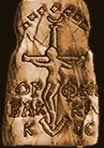
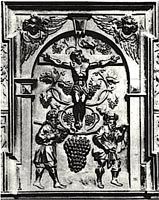
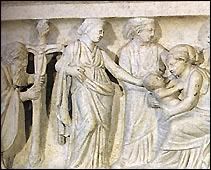
Moksha also mentioned Mithra:
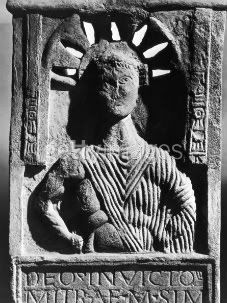
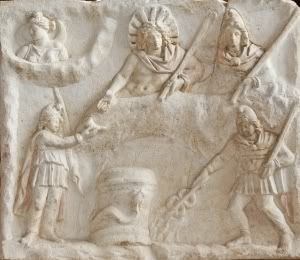
In the 3rd century BC, the worship of Serapis became a state sponsored religion and the Ptolemies sought to apply as much mass appeal to the new god as possible. Some have even suggested that early Christians were indistinguishable from worshippers of Serapis.
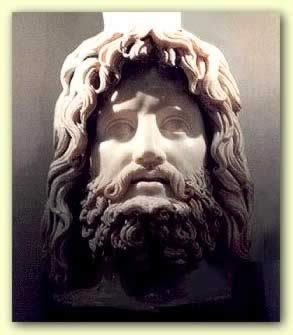
"Egypt, which you commended to me, my dearest Servianus, I have found to be wholly fickle and inconsistent, and continually wafted about by every breath of fame. The worshippers of Serapis are called Christians, and those who are devoted to the god Serapis, call themselves Bishops of Christ."
– Hadrian to Servianus, 134 AD (Quoted by Giles, Hebrew and Christian Records, vol. ii, p86, 1877)
Just from the images, you can see clear parallels between other deities of the time, as well as similarity in stories. You don't even need an explanation to find the Mithras Banquet image a little familiar.
To suggest that there are no similarities would be the equivalent of burying your head in the sand... truly. A crucified Dionysus 400 years before Christ in the same vicinity? A virgin-born Mithra whose members partake of his flesh just like the Christian sacrament? These are fairly specific parallels.
I, of course, understand the reluctance of believers to accept that a synthesis of these stories created their religion, but don't pretend that it isn't a possibility.





